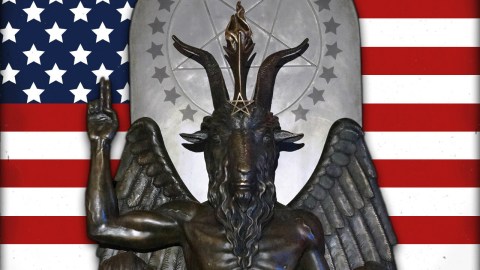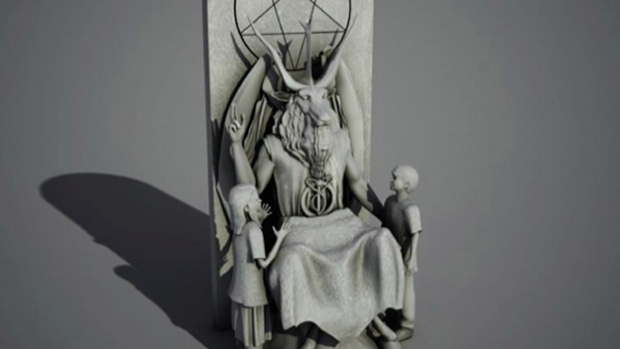Satanists unveil 8-foot ‘Baphomet’ statue at Arkansas State Capitol

The Satanic Temple unveiled a statue of the occult idol Baphomet outside the Arkansas State Capitol building on Thursday to protest the Ten Commandments monument already on capitol grounds.
The rally was attended by about 150 Satanists, Christians, atheists and curious onlookers, all of whom were peaceful apart from one protestor who was escorted away by police after interrupting a Christian speaker.
It was a spectacle designed to highlight First Amendment values, event organizers said.
“If you’re going to have one religious monument up then it should be open to others, and if you don’t agree with that then let’s just not have any at all,” said Satanic Arkansas co-founder Ivy Forrester, who helped organize the rally.
NOW: The Satanic Temple is rallying around their Baphomet statue at the Arkansas State Capitol. #arnews #arpx pic.twitter.com/AgO4CESKMq
— Marine Glisovic KATV (@KATVMarine) August 16, 2018
Lucien Greaves, spokesman and co-founder of the Satanic Temple, echoed a similar sentiment.
“The event is intended to be an inclusive gathering where The Satanic Temple will be celebrating pluralism along with Christian and secular speakers. People of many faiths will come together at the Capitol to reject the Arkansas State Legislature’s efforts to privilege one religion over others.”
Church members against this Satanic Temple rally are also here at the Arkansas State Capitol. #arnews #arpx @KATVNews pic.twitter.com/N3lZHwbPFU
— Marine Glisovic KATV (@KATVMarine) August 16, 2018
In a video of the rally, what appear to be Christian counter-protestors can be seen holding signs that read “you shall have no other gods before me” and “I am the Lord your God.” However, it’s unclear whether any protestors who seemed or claimed to be Satanists were actually interested in idol worship or the occult. After all, the Satanic Temple, not to be confused with the Church of Satan, is partly a political activist group whose stated mission is to encourage the separation of church and state and “benevolence and empathy among all people.”
In any case, the Ten Commandments monument at the capitol building in Little Rock was installed in 2017 after state legislators had “overwhelmingly approved” an act calling for its erection, according to Arkansas state Sen. Jason Rapert, who sponsored the bill and is a Christian preacher.
In a Facebook post, Rapert said he supports the free speech rights of the protestors, whom he called “extremists” and “outsiders” with “unorthodox views.”
However, Rapert wrote that it will be a “very cold day in hell before an offensive statue will be forced upon us to be permanently erected on the grounds of the Arkansas State Capitol” and that the Ten Commandments monument reflects a “historical and moral foundation of law.”
The Supreme Court has agreed with a similar viewpoint in the past.
In Van Orden v. Perry (2005), the Supreme Court ruled in a 5-4 decision that a Ten Commandments monument on the grounds of the Texas state capitol didn’t violate the First Amendment’s Establishment clause, which bars the government from establishing laws that endorse or respect the establishment of a particular religion.
The plurality wrote that, though the Ten Commandments might be religious in origin, “simply having religious content or promoting a message consistent with a religious doctrine does not run afoul of the establishment clause.”
But Justice Souter’s dissenting opinion noted that the Ten Commandments “do not confine themselves to arguably secular matters, such as honoring one’s parents, killing or murder, adultery, stealing, false witness, and covetousness. Rather, the first part of the Commandments concerns the religious duties of believers: worshipping the Lord God alone, avoiding idolatry, not using the Lord’s name in vain, and observing the Sabbath Day.”
Souter’s dissenting opinion also noted that, as with the monument in Little Rock, the Ten Commandments monument in Texas began with the words “I AM the LORD thy God.”
In June, a court merged two federal lawsuits that sought to have the monument removed from state capitol grounds. One was brought by the American Civil Liberties Union of Arkansas and the other by a separate coalition of plaintiffs. The Satanic Temple had reportedly tried to join the case brought by the ACLU, but the organization asked the court to deny the request.





